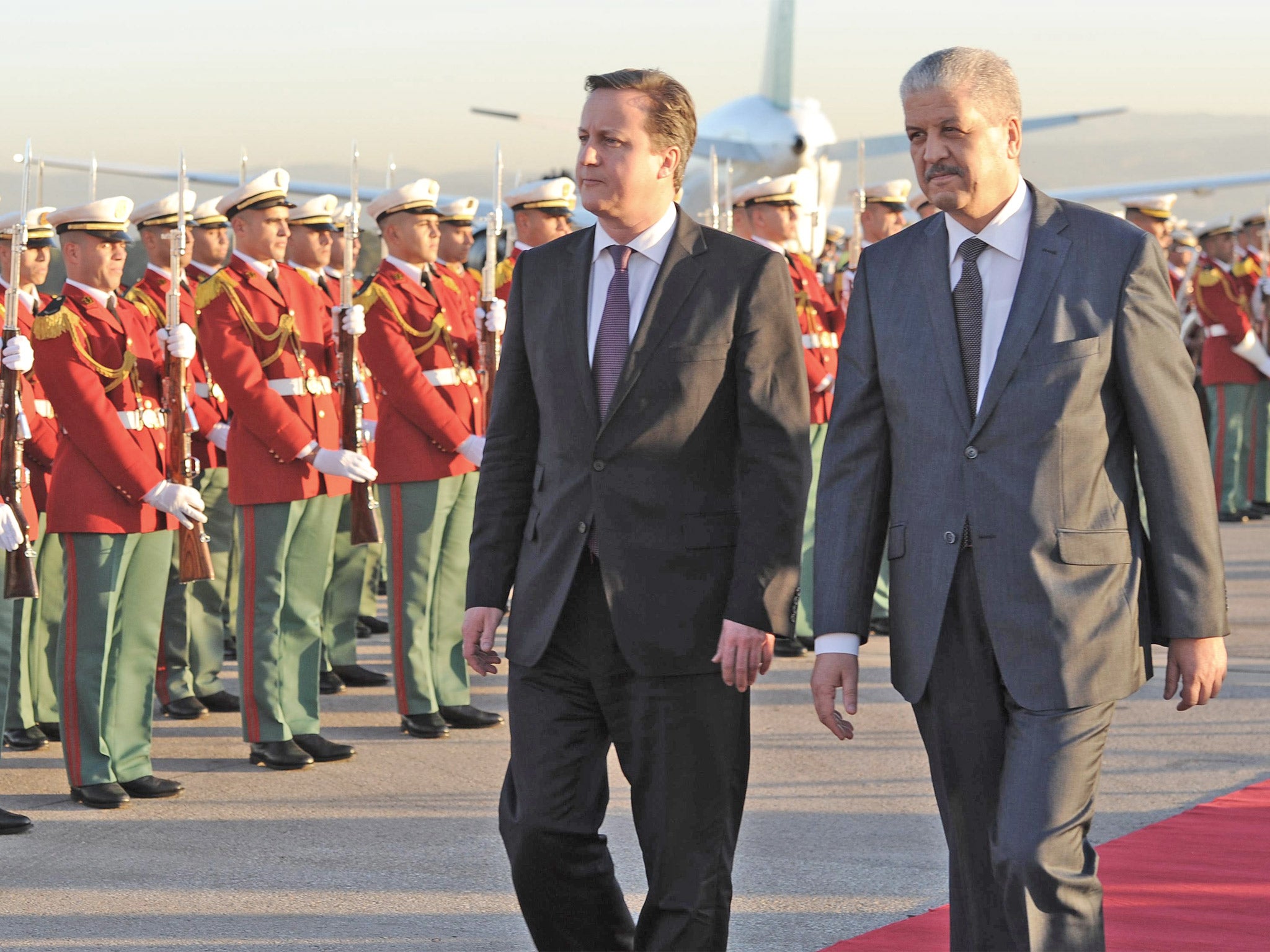Defence budget in disarray as minister fails to back up David Cameron's bold spending pledge

Government plans for Armed Forces spending appeared to be in disarray today after the Defence Secretary was unable to confirm David Cameron's apparent commitment to above-inflation budget rises.
Earlier, senior sources were said to have confirmed that Cameron would honour the commitment to above-inflation rises in the defence budget after 2015.
Tensions have been growing in the Coalition as negotiations begin over how to save billions of pounds more in the 2015-16 spending review, with Defence Secretary Philip Hammond believed to be among ministers opposed to further cuts.
Mr Hammond has already seen his budget slashed by 8% in real terms since 2010.
During a trip to North Africa the PM signalled that he "does not resile" from comments he made in October 2010, when he appeared to accept that defence spending had to start rising again from 2015 onwards.
However, Mr Hammond today said that the equipment side of his budget - accounting for roughly half of MoD spending - would rise in real terms, but that there would be a "robust discussion" about other elements.
"I have a firm commitment that the equipment plan, which is a very large part of the defence budget, will rise in real terms by 1% a year between 2015 and 2020, that's a commitment that has previously been made and repeated since the Chancellor delivered his Autumn Statement," he told BBC Radio 4's Today programme.
"But there is going to be a spending review for 2015/16 and I will go into that arguing the case for the resources that defence needs to deliver the plan that we have set out, Future Force 2020, and I am very confident that we will have a robust discussion about that."
On the subject of overall defence spending Mr Hammond said: "What I know is that I have a firm commitment on the equipment plan, which about roughly half the defence budget is covered by that. That will rise in real terms after 2015."
Asked whether staffing budgets could be cut, he said: "The rest of the budget will be subject to a discussion around the spending review the Chancellor announced in the Autumn Statement. But I'm going into that spending review discussion on the basis that I expect the outputs that I have defined to be protected."
Tory backbenchers are among those voicing fears that the long-term capabilities of the military could be degraded unless more money is found.
The issue has been cast into sharper relief by the Government's commitment of up to 330 personnel and air support to the campaign against rebels in Mali.
Protecting MoD budgets could mean harsher treatment for the police and other services.
The confusion comes amid warnings from the Whitehall spending watchdog that any further cost-overruns on the Ministry of Defence equipment programme could jeopardise its future plans for the armed forces and as Mr Hammond published a detailed equipment plan for the next ten years which, he said, had finally eliminated a £79 billion "black hole" inherited from the former Labour government.
The £159 billion programme includes £35.8 billion for a new generation of nuclear-powered submarines, £18.5 billion for combat aircraft for the RAF and £17.4 billion for Royal Navy warships, including the Queen Elizabeth Class aircraft carriers.
Within the plan there is £4.8 billion for contingencies as well as £8 billion of "unallocated" funding which the MoD said would be allocated to meet new equipment priorities as they emerged over the coming decade.
But the National Audit Office said there was "systemic over-optimism" built in to the MoD's planning which ran the risk of leaving "capability gaps" in the years ahead. While the NAO acknowledged that the MoD had taken "significant positive steps" to address the affordability of the equipment programme, it expressed concern that the contingency allocation was insufficient.
It warned that if the MoD was forced to fall back on the unallocated funding to make-up the shortfall, it would be unable to deliver in full the plans set out in the 2010 Strategic Defence and Security Review - known as Future Force 2020.
"There is systemic over-optimism inherent in the department's assumptions around the costing of risk and uncertainty at both project and portfolio levels, which may not be sufficiently mitigated by the contingency provision," the NAO said.
"The £8 billion of unallocated budget does offer protection to the core programme. However, our review of departmental documents and interviews with departmental personnel suggest that the unallocated budget is essential to deliver the full intent behind Future Force 2020.
"Using this budget to protect the core programme would therefore result in capability gaps."
Margaret Hodge, the chairman of the Commons Public Accounts Committee, said they would be taking evidence from MoD officials in order to assess the robustness of the plan.
"The Ministry's track record in forecasting accurately the cost of its largest projects hardly inspires confidence," she said.
"Between 2000 and 2012, the cost of its 69 largest projects ballooned by £11 billion. Independent analysis in 2009 found that final project costs were typically 40% higher than the Ministry's initial forecasts.
"Given this past performance, I am dismayed that the Ministry is still taking an over-optimistic view to putting a price on risk and uncertainty."
Mr Hammond, however, insisted that the plan would ensure that Britain's armed forces remained among the most capable and best equipped anywhere in the world.
"For the first time in a generation the armed forces will have a sustainable equipment plan," he said.
"Step by step, we are clearing up years of mismanagement under the last government by ending the culture of over-promising and under-delivering that created a multibillion pound black hole in the defence budget."
Join our commenting forum
Join thought-provoking conversations, follow other Independent readers and see their replies
Comments
Bookmark popover
Removed from bookmarks